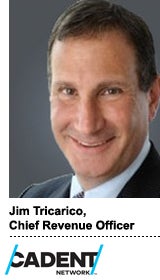 Traditional cable nets are increasingly turning to video demand-side platforms to factor things like digital purchase habits into the TV-planning process.
Traditional cable nets are increasingly turning to video demand-side platforms to factor things like digital purchase habits into the TV-planning process.
Cadent Network, a national media network that partners with more than 200 multichannel video programming distributors (MVPD) and more than 80 cable networks at the local and national level, including Verizon FiOS, Comcast and Cablevision, is the latest.
The company on Tuesday revealed a new data and research agreement with video buy-side platform Videology, which will improve Cadent’s ability to measure television advertising effectiveness within its TV media platform.
“Marketers have traditionally gone after audience demos very broadly, such as 25-54 adults,” said Jim Tricarico, Cadent’s chief revenue officer. “Videology helps us layer data and research on top of our platform to access Acxiom, Rentrak, Nielsen TV/MRI, and set-top box data, which can drastically narrow down those targets.”
Although it is partnering with Videology to explore new data sets and access to new digital inventory, Cadent’s CRO said the relationship is not necessarily exclusive given clients and agencies’ varying comfort levels with different video consoles.
“Adap.tv and TubeMogul all have their strengths and differences, and you see [agencies like] MAGNA Global using TubeMogul while WPP/Mindshare use Videology,” he said. “They often don’t want to partner with just one, they want to partner with several to see which is most effective for their needs.”
Tricarico, former CRO for Screenvision and an EVP at Viacom, said chief among the challenges for TV networks is gaining access to more datasets. Because brands are increasingly asking to augment their first-party data, such as call center or in-store sales figures, it’s requiring networks to be more nimble.
That said, application of data in real-time is still very much a digital specialty and just because a marketer has access to performance data, it doesn’t necessarily mean it’s factored into the context of the TV buy.
“We’re getting performance data back from our partners as efficiently as we can [but that occurs] mostly on a weekly basis,” Tricarico said. “We analyze that data on the back-end and make sure we can use it to optimize the campaign in flight if we have to, but if anyone’s telling you they’re getting data in real-time for [application to] TV right now, it’s not true.”
TV networks are not only grappling with buyer demand for more automation and enhanced data targeting within the network planning and buying process. There is also room to improve overall addressability and monetization for video-on-demand by combining set-top box data with things like online purchase habits, which underscored Cadent’s deal with Videology, Tricarico said.












